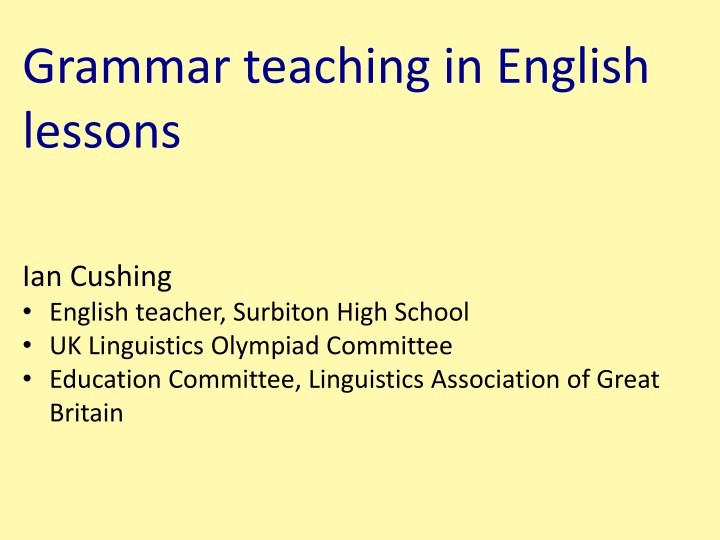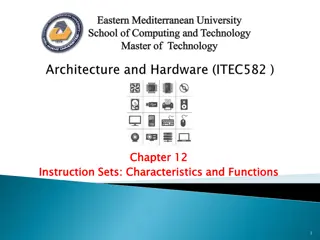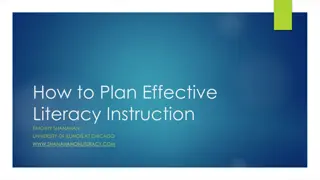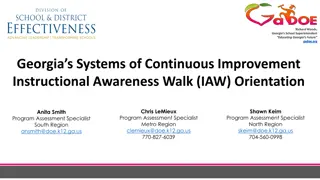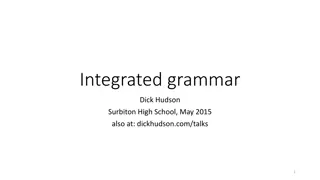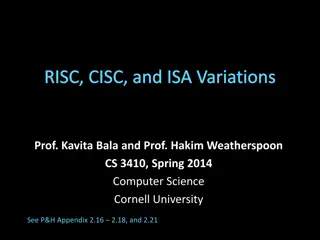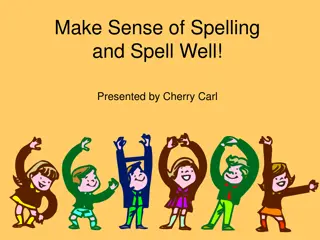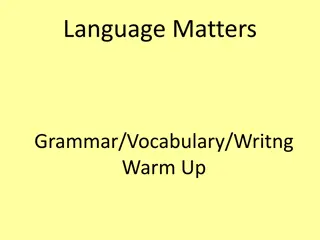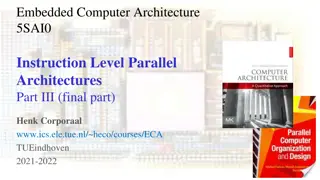Enhancing Grammar Instruction for Effective Learning
Teaching grammar in English lessons is crucial to enhance creative and analytical writing skills, boost language knowledge, and foster awareness of writer's craft. Engage students in contextualized grammar teaching to make learning meaningful and impactful.
Download Presentation

Please find below an Image/Link to download the presentation.
The content on the website is provided AS IS for your information and personal use only. It may not be sold, licensed, or shared on other websites without obtaining consent from the author.If you encounter any issues during the download, it is possible that the publisher has removed the file from their server.
You are allowed to download the files provided on this website for personal or commercial use, subject to the condition that they are used lawfully. All files are the property of their respective owners.
The content on the website is provided AS IS for your information and personal use only. It may not be sold, licensed, or shared on other websites without obtaining consent from the author.
E N D
Presentation Transcript
Grammar teaching in English lessons Ian Cushing English teacher, Surbiton High School UK Linguistics Olympiad Committee Education Committee, Linguistics Association of Great Britain
Why teach grammar? To improve creative writing To improve analytical writing and reading To improve knowledge about language both in L1 and L2
How to teach grammar? Teaching grammar in a contextualised way makes it more meaningful for students Increases their ability to (1) write creatively, (2) write analytically and (3) read analytically This approach makes students aware of a writer s craft, thus making them more aware of their own craft
You can teach somebody the names of parts of a bicycle but that doesn t mean they will be able to tell you how the bicycle works
You can teach somebody the names of parts of a language but that doesn t mean they will be able to tell you how the language works
Verb types in A Christmas Carol (Year 8; mid-high ability)
Place these verbs into different groups. Give each group a title. PAINT STEP REPLY SEIZE WHISPER OBSERVE LOOK HINT SMILE LISTEN APPEAR WATCH BE CONSIDER WONDER DIG TALK GRAB READ ALLOW BECOME FALL KISS HAVE
What groups did you come up with and why? Actions (a doer and something that is done to ) Thoughts/feelings/behaviours (someone who senses /feels/behaves) Speech (a way of talking / listening)
And then: Getting students to spot the semantic and grammatical relations between words rain < > pelt sun < > burn wind < > blow
What is required to teach grammar? Are English teachers sufficiently trained?
Grammar on the National Curriculum 2014 (KS3) Pupils should be taught to consolidate and build on their knowledge of grammar and vocabulary through: studying the effectiveness and impact of the grammatical features of the texts they read drawing on new vocabulary and grammatical constructions from their reading and listening, and using these consciously in their writing and speech to achieve particular effects knowing and understanding the differences between spoken and written language, including differences associated with formal and informal registers, and between Standard English and other varieties of English using Standard English confidently in their own writing and speech discussing reading, writing and spoken language with precise and confident use of linguistic and literary terminology
KS3 Glossary: intended as an aid for teachers, not as the body of knowledge that should be learnt by pupils Active voice Adjective Adverb Adverbial Antonym Apostrophe Article Auxiliary verb Clause Cohesion Cohesive device Complement Compound Conjunction Consonant Co-ordination Determiner Digraph Ellipsis Etymology Finite verb Fronting Future Grapheme Grapheme phoneme correspondences Head Homophone Infinitive Inflection Intransitive verb Main clause Modal verb Modifier Morphology Noun Noun phrase Object Participle Passive Past tense Perfect Phoneme Phrase Plural Possessive Prefix Preposition Present tense Progressive Pronoun Punctuation RP Register Relative clause Root Schwa Sentence Standard English Stress Subject Subjunctive Subordinate Suffix Syllable Synonym Tense Transitive Trigraph Verb Vowel Word Word class Word family
Challenges and restrictions to a cross-curricular approach Getting English and MFL teachers to talk to each other Teacher willingness Support from management Time
Thanks for listening sorry I can t answer any questions! ian.cushing@surbitonhigh.com
